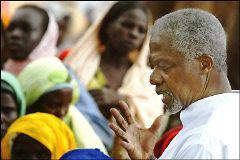Annan lays out plan for enormous Sudan peacekeeping mission
By NICK WADHAMS, Associated Press Writer
UNITED NATIONS, Feb 3, 2005 (AP) — U.N. Secretary-General Kofi Annan proposed sending a 10,130-strong force to monitor a peace deal ending Sudan’s civil war, and warned of the “hugely complex task” that would await the mission, according to a report released Thursday
 In his report to the U.N. Security Council, Annan laid out his vision for a mission that would be one of the most complex the United Nations has ever faced. The size of western Europe, Sudan is shattered from its 21-year-civil war and still faces a full-blown humanitarian crisis in its western Darfur region.
In his report to the U.N. Security Council, Annan laid out his vision for a mission that would be one of the most complex the United Nations has ever faced. The size of western Europe, Sudan is shattered from its 21-year-civil war and still faces a full-blown humanitarian crisis in its western Darfur region.
The deployment, which must be approved by the Security Council, would help monitor a Jan. 9 peace deal as well as provide humanitarian assistance to the millions of people displaced by the war. It would also help demobilize child soldiers and tackle the problem of Sudan’s huge and largely unmarked mine fields.
It would even raise awareness of HIV and AIDS and protect women’s rights.
“Harmonizing all aspects of the comprehensive peace agreement will be a hugely complex task,” Annan said in the report. “The stakes and tasks are enormous for both the Sudanese people and the parties.”
Alongside the problems inherent in enforcing the peace deal, there are far more basic problems: decrepit roads, unexploded ordnance, a broken railway system, and continued conflict in the northeast and the western Darfur region.
The mission would deploy some military observers to Darfur, and U.N. staff would work closely with African Union officials running their own mission in Darfur, where conflict between the government-backed Janjaweed militia and rebels has killed tens of thousands and displaced some 2 million more.
The report, dated Jan. 31 but released Thursday, comes just after a U.N.-appointed commission released the results of an investigation of the Darfur crisis. The commission found evidence of crimes against humanity and war crimes, but stopped short of labeling the crisis as a genocide.
The Security Council was to discuss the report on Friday, and is expected to approve the peacekeeping deployment in a resolution, possibly sometime next week.
Council members, however, haven’t decided if they should try to respond to the Darfur report — possibly with sanctions, an arms or oil embargo, or referrals to a war crimes tribunal — when raising the issue of the peacekeeping deployment.
The peacekeepers would be deployed under Chapter 6 of the U.N. Charter, meaning they can use force to protect people who are directly threatened with violence. That gives them less power to use force than if they were deployed to help restore order.
